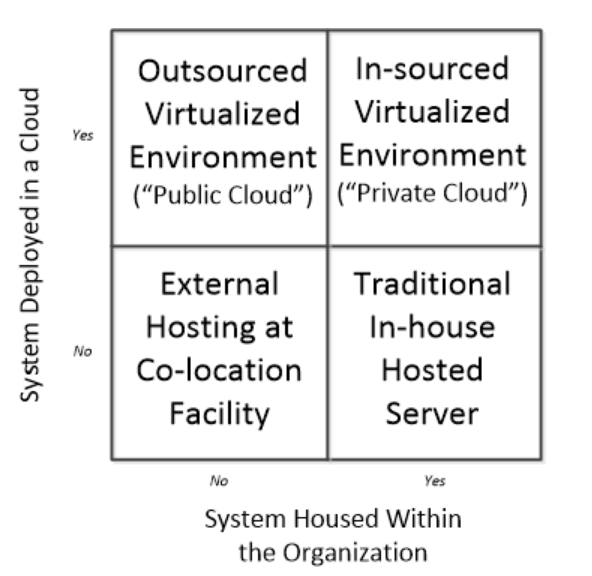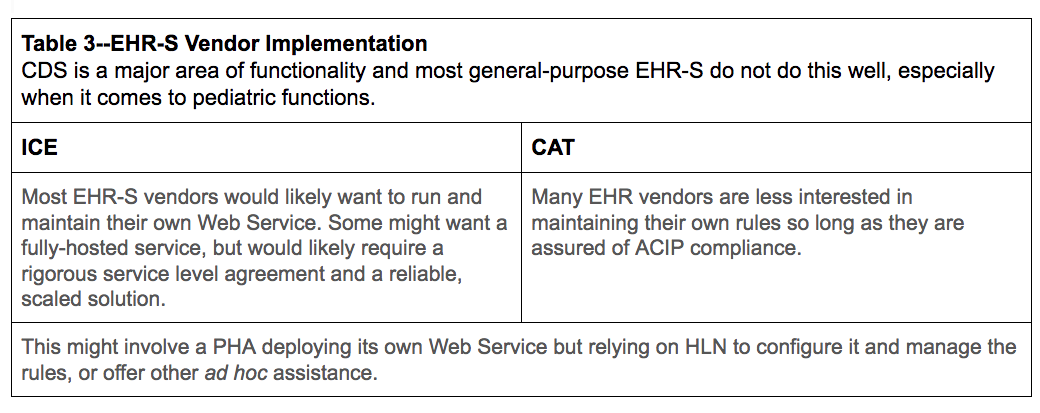Why Cloud-Based Public Health Solutions are a Good Option for Clinical Decision Support
 Noam H. Arzt, Ph.D.Cloud computing is one of the most powerful technology deployment strategies in use today. In fact, the notion of cloud resources has become prominent in consumer computing with only a limited understanding of what it means or does (e.g., Apple iCloud and Google Cloud). In this article we will examine some of the key reasons to host public health clinical decision support (CDS) solutions in the cloud.
Noam H. Arzt, Ph.D.Cloud computing is one of the most powerful technology deployment strategies in use today. In fact, the notion of cloud resources has become prominent in consumer computing with only a limited understanding of what it means or does (e.g., Apple iCloud and Google Cloud). In this article we will examine some of the key reasons to host public health clinical decision support (CDS) solutions in the cloud.
In a recent national survey, 95% of respondents indicated that they were using some form of cloud computing in their environment. In a survey of state CIOs in 2013, the National Association of State Chief Information Officers (NASCIO) found that while 6% of states were already highly invested in cloud services, 68% had some applications in the cloud and were considering others. By 2014, just one year later, 20% of states reported being highly invested and 73% had some applications in the cloud and were considering others. More and more jurisdictions are contemplating deployment of cloud computing environments as well.
The first step is to to understand the difference between cloud computing and traditional computing.
Traditionally, computer software was deployed on specific servers housed within the organization or a service provider – internal or external – who was contracted to provide the server environment. As the technical and operational requirements for a system changed, the physical attributes of the server(s) (e.g., processor, RAM, disk space) would be changed to accommodate.

Under a cloud computing model, however, the virtualized environment can support multiple “virtual” servers that can be configured and reconfigured to support various applications as the needs change. That means that the environment can be expanded or reduced based on the changing needs of the project without new servers being acquired and installed or existing servers being de-commissioned and removed. In many implementations, the services available to a customer can be raised or lowered with a simple “turn of a virtual knob” that provides more processing, RAM, or disk space to a system automatically. As displayed in this diagram, either traditional or cloud-based services can be housed within the organization or provided through an external service provider.
What is Clinical Decision Support for Immunizations?
Clinical Decision Support for Immunizations, or CDSi, is defined as, “an automated process that determines the recommended immunizations needed for a patient and delivers these recommendations to the healthcare provider… (it provides) healthcare providers with immunization evaluation and forecasting tools designed to automatically determine the recommended immunizations needed when a patient presents for vaccination.” As the vaccination schedule gets more and more complex – and continues to reach across the lifespan beyond childhood – CDSi becomes a more and more critical component of health information systems (for a fuller treatment of this topic see my recent article).
One of the most notable Open Source CDSi products is the Immunization Calculation Engine (ICE) and related tools and utilities which were originally developed with funding from the New York City Department of Health and Mental Hygiene (NYC DoHMH). Though NYC retains the copyright to these products, the agency graciously released this software into the Open Source community under a GNU Lesser General Public License (LGPL) version 3. The software actually consists of two major components:
- The ICE Web Service evaluates a patient’s immunization history and generates the appropriate immunization recommendations for the patient. The web service is implemented using OpenCDS, a general-purpose Open Source CDS platform. A limited set of patient data is sent to the web service, and a response is sent back to the original requester.
- The Clinical Decision Support Administration Tool (CAT) is a web-based GUI tool that enables subject matter experts to manage ICE rules and configuration without the intervention of software developers. CAT is still under development and is being released in a modular fashion as features become available. The first CAT module to be made available will be the Test Editor which enables subject matter experts to create, store, and manage test cases. The second module will be the rule authoring tool. CAT is not required for the ICE web service to run but is used to update its configuration; it does not contain or manipulate any patient data. CAT can run on the same server – or a different server – as ICE.
Why is it good to host CDSi in the cloud?
CDSi services and tools can be hosted within an organization or externally. Externally hosted services may provide some distinct advantages for organizations, including:
- Reduced barriers of entry for new users. If offered as a “one stop shop” a hosted solution could allow an organization to begin using the services more quickly than if the organization hosted the service on its own. For some organizations this is simply an easier solution to implement.
- Hosting of core service and tools are separable. Organizations can make independent decisions about hosting the core CDS service and any administrative tools with little dependence of one strategy on the other.
- Relatively lightweight products to deploy. CDSi services like ICE are relatively lightweight services; administrative tools like CAT are relatively lightweight tools. Deploying these with modest service level expectations would not be too difficult nor too expensive, though more scaled service level expectations may present additional requirements.
- Secure (even HIPAA-certified) cloud service providers readily available. There are several reputable and reliable cloud service providers to choose from, including Amazon Web Services (AWS) and Microsoft’s Azure cloud services, both of which offer a Government-targeted solution.
- Less responsibility over runtime environment. External hosting allows an organization to seek outside help to support its runtime environment, including debugging problems.
- Avoids additional regulation. External hosting passes much of the additional privacy and security regulation compliance to the hosting service provider, though the organization bears ultimate compliance responsibility.
- Avoids additional diligence and effort on security. Whether HIPAA is relevant or not, the hosting provider and not the organization ensures that the service is secure and defended against attack both upon its data and its service capability. External and repeated audit of the service and its platform is usually provided.
- Avoid distraction from other more crucial activities. With limited staff, using an externally a hosted service might serve to avoid distraction by the organization from more important activities more central to its mission.
Several hosting models exist for CDS products depending on the profile and needs of the organization. HLN uses cloud-based services for all of its development and supports cloud-based deployments for its customers. The tables below describe the likely hosting needs of different types of customers for CDSi products that HLN offers as exemplars of other CDS services that could be provided in a cloud-based environment:





- Tags:
- Amazon Web Services (AWS)
- Clinical Decision Support (CDS)
- Clinical Decision Support Administration Tool (CAT)
- clinical decision support for immunizations (CDSi)
- Cloud Computing
- cloud resources
- cloud-based public health solutions
- health information systems
- HIPAA-certified cloud service providers
- ICE Web Service
- Immunization Calculation Engine (ICE)
- immunization history
- Lesser General Public License (LGPL)
- Microsoft Azure cloud services
- National Association of State Chief Information Officers (NASCIO)
- New York City Department of Health and Mental Hygiene (NYC DoHMH)
- Noam H. Arzt
- Open Source community under
- open source software (OSS)
- OpenCDS
- public health
- vaccination
- vaccination schedule
- Login to post comments